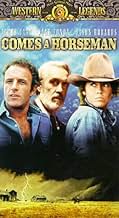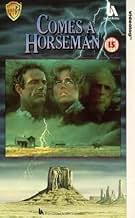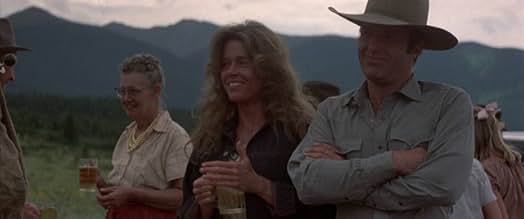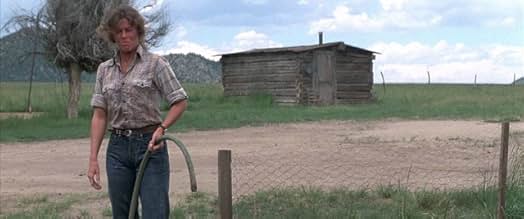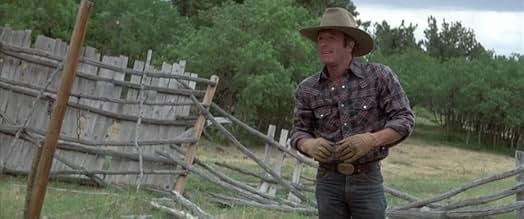NOTE IMDb
6,3/10
3,8 k
MA NOTE
Une femme courageuse et fière lutte pour sa terre, trouvant de l'aide et quelque chose de plus de manière inattendue.Une femme courageuse et fière lutte pour sa terre, trouvant de l'aide et quelque chose de plus de manière inattendue.Une femme courageuse et fière lutte pour sa terre, trouvant de l'aide et quelque chose de plus de manière inattendue.
- Réalisation
- Scénario
- Casting principal
- Nommé pour 1 Oscar
- 5 victoires et 4 nominations au total
Allan Baker
- Pall Bearer
- (non crédité)
Antonino B. Garcia
- School Kid
- (non crédité)
Cary Huff
- Army Bugler
- (non crédité)
Avis à la une
Although at times the pace of Comes A Horseman is maddeningly slow, the players acquit themselves well in this old western type plot from the 19th century updated to 1945 and the end of World War II.
Stars Jane Fonda and Jason Robards, Jr. have history together, were even married at one time. He's the local Ponderosa owner, she's barely getting by on the small spread her dad left her.
Robards is in a cash flow situation though for the life of me he should be prospering during World War II and army beef contracts. The demand will slacken some due to war's end. There's possible oil on the property that oilman George Grizzard would like to exploit. Possible oil on both properties. Also on neighbor James Caan's small spread. He joins forces with Fonda against Robards.
Jane might have gotten a few pointers from her dad who was never a western star as such, but Henry Fonda did a few classic westerns in his time. She comes across as a real western woman. Director Alan J. Pakula did some real good photography in those wide open spaces. That frontier square dance could have come from a John Ford western.
Richard Farnsworth established a career as a player with an Oscar nomination for Best Supporting Actor. That drawl at times is slow, but he's also unbelievably realistic as a veteran cowboy who has lost a step or two and realizes he can't quite the help to Fonda he'd like to be. That fall from his horse after those explosions is agonizingly real for a man getting on.
Slow paced, but well done, Comes A Horseman is a fine modern western if indeed a western of times of the last century can be classified as modern. You might want to watch this back to back with Giant, another modern western about cattlemen and how they adapt to the coming of oil.
Stars Jane Fonda and Jason Robards, Jr. have history together, were even married at one time. He's the local Ponderosa owner, she's barely getting by on the small spread her dad left her.
Robards is in a cash flow situation though for the life of me he should be prospering during World War II and army beef contracts. The demand will slacken some due to war's end. There's possible oil on the property that oilman George Grizzard would like to exploit. Possible oil on both properties. Also on neighbor James Caan's small spread. He joins forces with Fonda against Robards.
Jane might have gotten a few pointers from her dad who was never a western star as such, but Henry Fonda did a few classic westerns in his time. She comes across as a real western woman. Director Alan J. Pakula did some real good photography in those wide open spaces. That frontier square dance could have come from a John Ford western.
Richard Farnsworth established a career as a player with an Oscar nomination for Best Supporting Actor. That drawl at times is slow, but he's also unbelievably realistic as a veteran cowboy who has lost a step or two and realizes he can't quite the help to Fonda he'd like to be. That fall from his horse after those explosions is agonizingly real for a man getting on.
Slow paced, but well done, Comes A Horseman is a fine modern western if indeed a western of times of the last century can be classified as modern. You might want to watch this back to back with Giant, another modern western about cattlemen and how they adapt to the coming of oil.
If you like James Caan, (Frank Athearn), "City of Ghosts" who works as a cow hand for Jane Fonda, (Ella Connorfs),"Old Gringo" and owns a large stretch of land in the West and has just lost her husband in WW II and is left all by herself to run a big ranch along with Richard Farnsworth, (Dodger); who is an older man and has worked for Ella's father for many years on the ranch. Ella has some deep dark secrets in her life and rarely says a few words to anyone and plays the role of a rough and tough gal who can do everything by herself. Ella soon finds out she needs help and decides to hire Frank Athearn to assist her with her cattle. Jason Robards is a rich old man who has the hots for Ella and had become very close to her in the past and still wants to control her life. This is a different type of Western and if you like cattle, you can see them running all the time in and around all kinds of wood land. This picture disappointed me, however, Richard Farnsworth gave a great supporting role and was nominated for an Academy Award.
It may be my chick flick-oriented mind, but I believe there is a reason for the title, "Comes a Horseman." Ella Connor is the proverbial damsel in distress and in need of rescue. Frank arrives as the rescuer on a horse, but his role in this respect is not obvious because he is more dead than alive after being shot in an ambush. Instead of arriving as the conquering hero on horseback, he is slung across the saddle of Dodger, Ella's elderly ranch hand, who has found him gravely wounded. Dodger at once deposits Frank in the bunk house of Ella's ranch, where Dodger and Ella nurse him back to health.
I remember the touching, wistful scene in which Ella gazes at the doll house her late father had made for her when she was a little girl. The house is a perfect miniature of Ella's childhood home, which she has inherited from her parents. Her expression shows her longing for the unfulfilled dreams of finding Mr. Right and continuing her family's ranching tradition. There also is the scene in which Ella tries to bottle feed an orphaned foal, only to have the creature not survive. Ella shows her maternal instinct in caring for the animal, and this shows her unfulfilled dream of motherhood. Stoically, she carries the dead foal outside and buries it.
I especially noticed the respect Frank has for Ella and the companionship and partnership they share while working on the ranch, with these aspects of their association turning into true love and plans for marriage. Just before the tragic loss of the house, Frank comes home from town and sets a little black velvet box -- presumably holding an engagement ring -- at Ella's place at the kitchen table. Their relationship, along with the beautiful scenery of Colorado, really "make" this movie meaningful to me.
I remember the touching, wistful scene in which Ella gazes at the doll house her late father had made for her when she was a little girl. The house is a perfect miniature of Ella's childhood home, which she has inherited from her parents. Her expression shows her longing for the unfulfilled dreams of finding Mr. Right and continuing her family's ranching tradition. There also is the scene in which Ella tries to bottle feed an orphaned foal, only to have the creature not survive. Ella shows her maternal instinct in caring for the animal, and this shows her unfulfilled dream of motherhood. Stoically, she carries the dead foal outside and buries it.
I especially noticed the respect Frank has for Ella and the companionship and partnership they share while working on the ranch, with these aspects of their association turning into true love and plans for marriage. Just before the tragic loss of the house, Frank comes home from town and sets a little black velvet box -- presumably holding an engagement ring -- at Ella's place at the kitchen table. Their relationship, along with the beautiful scenery of Colorado, really "make" this movie meaningful to me.
8wcb
Jason Robards plays such a slimeball character in this that you know the ending from about the fourth minute. Nevertheless, it's a good story, with lots of hidden secrets to reveal. Caan plays a believable laid-back love interest for tough, gutsy Jane Fonda. The best thing is the photography, however-- in particular the dance scene, in which the camera follows Fonda and Caan as they move through a crowded outdoor dance floor without every losing either focus or the stars. Breathtaking. Some great mountains somewhere in Wyoming come close to stealing the show.
Really shouldn't be allowed to review film.
Contrary to popular belief, Lorem Ipsum is not simply random text. It has roots in a piece of classical Latin literature from 45 BC, making it over 2000 years old. Richard McClintock, a Latin professor at Hampden-Sydney College in Virginia, looked up one of the more obscure Latin words, consectetur, from a Lorem Ipsum passage, and going through the cites of the word in classical literature, discovered the undoubtable source. Lorem Ipsum comes from sections 1.10.32 and 1.10.33 of "de Finibus Bonorum et Malorum" (The Extremes of Good and Evil) by Cicero, written in 45 BC. This book is a treatise on the theory of ethics, very popular during the Renaissance. The first line of Lorem Ipsum, "Lorem ipsum dolor sit amet..", comes from a line in section 1.10.32.
Contrary to popular belief, Lorem Ipsum is not simply random text. It has roots in a piece of classical Latin literature from 45 BC, making it over 2000 years old. Richard McClintock, a Latin professor at Hampden-Sydney College in Virginia, looked up one of the more obscure Latin words, consectetur, from a Lorem Ipsum passage, and going through the cites of the word in classical literature, discovered the undoubtable source. Lorem Ipsum comes from sections 1.10.32 and 1.10.33 of "de Finibus Bonorum et Malorum" (The Extremes of Good and Evil) by Cicero, written in 45 BC. This book is a treatise on the theory of ethics, very popular during the Renaissance. The first line of Lorem Ipsum, "Lorem ipsum dolor sit amet..", comes from a line in section 1.10.32.
Le saviez-vous
- AnecdotesStuntman Jim Sheppard was killed when a horse that was dragging him veered from its course and caused him to hit his head on a fence post. The scene appears in the movie, although it was cut right before Sheppard's fatal accident.
- GaffesWhen Ewing is shot and falls off of his horse, his foot slips THROUGH the stirrup. When the horse gallops away, the foot of the stuntman doubling for Jason Robards is TIED to the stirrup by a long strap that can be safely released.
- Citations
Frank 'Buck' Athearn: You know lady, you got balls the size of grapefruits.
- Crédits fousOur thanks to the Forest Service for allowing us to film in the Coconino National Forest
- Bandes originalesGet Along Little Dogies
Cowboy cattle song
Meilleurs choix
Connectez-vous pour évaluer et suivre la liste de favoris afin de recevoir des recommandations personnalisées
- How long is Comes a Horseman?Alimenté par Alexa
Détails
Box-office
- Budget
- 10 000 000 $US (estimé)
- Montant brut aux États-Unis et au Canada
- 9 585 769 $US
- Montant brut mondial
- 9 585 769 $US
- Durée1 heure 58 minutes
- Couleur
- Rapport de forme
- 2.39 : 1
Contribuer à cette page
Suggérer une modification ou ajouter du contenu manquant



